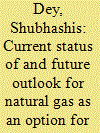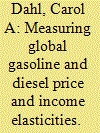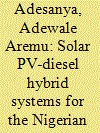| Srl | Item |
| 1 |
ID:
118822


|
|
|
|
|
| Publication |
2013.
|
| Summary/Abstract |
Diesel vehicles offer greater fuel-efficiency and lower greenhouse gas emissions at a time when national governments seek to reduce the energy and climate impacts of the vehicle fleet. Policies that promote diesels like preferential fuel taxes, fuel economy standards and greenhouse gas emission standards can produce higher emissions of diesel particulate matter if diesel particulate filters or equivalent emission control technology is not in place. This can undermine the expected climate benefits of dieselization and increase impacts on public health. This paper takes a historical look at Europe to illustrate the degree to which dieselization and lax controls on particulate matter can undermine the potential benefits sought from diesel vehicles. We show that countries on the dieselization pathway can fully capture the value of diesels with the adoption of tailpipe emission standards equivalent to Euro 6 or Tier 2 for passenger cars, and fuel quality standards that limit the sulfur content of diesel fuel to no greater than 15 ppm. Adoption of these policies before or in parallel with adoption of fuel consumption and greenhouse gas standards can avert the negative impacts of dieselization.
|
|
|
|
|
|
|
|
|
|
|
|
|
|
|
|
| 2 |
ID:
098566


|
|
|
|
|
| Publication |
2010.
|
| Summary/Abstract |
This paper discusses the uptake potential for a wind-diesel production incentive designed specifically for Canadian northern and remote communities. In spite of having over 300 remote communities with extremely high electricity costs, Canada has had little success in developing remote wind energy projects. Most of Canada's large-scale wind power has been developed as a direct result of a Federal production incentive implemented in 2002. Using this incentive structure as a successful model, this paper explores how an incentive tailored to remote wind power could be deployed. Micro-power simulations were done to demonstrate that the production incentive designed by the Canadian Wind Energy Association would cost on average $4.7 $Cdn million and could be expected to result in 14.5 MW of wind energy projects in remote villages in Canada over a 10 year period, saving 11.5 $Cdn million dollars in diesel costs annually, displacing 7600 tonnes of CO2eq emissions and 9.6 million litres of diesel fuel every year.
|
|
|
|
|
|
|
|
|
|
|
|
|
|
|
|
| 3 |
ID:
149877


|
|
|
|
|
| Summary/Abstract |
Energy policy literature tends to emphasise the impact of taxation on energy preference. However, the present case concerning extremely low acceptance of diesel cars in Japan could not be explained by taxation. As a possible factor, the paper sheds light upon discourse around the energy policy. The policy aimed to characterise diesel technology as emitting particulate matter and nitrogen oxide (NOx). The paper contributes to extending the existing understanding of the role of public policy by embracing the linguistic interactions complemented by visualisation.
|
|
|
|
|
|
|
|
|
|
|
|
|
|
|
|
| 4 |
ID:
116414


|
|
|
| 5 |
ID:
111310


|
|
|
|
|
| Publication |
2012.
|
| Summary/Abstract |
Price and income elasticities of transport fuel demand have numerous applications. They help forecast increases in fuel consumption as countries get richer, they help develop appropriate tax policies to curtail consumption, help determine how the transport fuel mix might evolve, and show the price response to a fuel disruption. Given their usefulness, it is understandable why hundreds of studies have focused on measuring such elasticities for gasoline and diesel fuel consumption. In this paper, I focus my attention on price and income elasticities in the existing studies to see what can be learned from them. I summarize the elasticities from these historical studies. I use statistical analysis to investigate whether income and price elasticities seem to be constant across countries with different incomes and prices. Although income and price elasticities for gasoline and diesel fuel are not found to be the same at high and low incomes and at high and low prices, patterns emerge that allow me to develop suggested price and income elasticities for gasoline and diesel demand for over one hundred countries. I adjust these elasticities for recent fuel mix policies, and suggest an agenda of future research topics.
|
|
|
|
|
|
|
|
|
|
|
|
|
|
|
|
| 6 |
ID:
118817


|
|
|
|
|
| Publication |
2013.
|
| Summary/Abstract |
From 1980 to 1995, France was the first European country in which diesel cars became more popular than petrol cars. In addition to offering improved performance, this preference was notably due to a much cheaper cost of use, in line with the taxation on both fuel types. But the advantage of diesel technology does not clearly seem to extend to energy and CO2 savings. In this paper, French trends over the last 15 years and latest annual available statistics about both diesel car ownership and use are analysed, on the basis of the "ParcAuto" panel data source. The results notably show that, from the moment the gap between fuel prices was reduced, the annual mileage amounts of diesel cars have fallen faster than those of petrol cars. A specific section summarizes the results of our work on the behaviour of French households who chose to replace their petrol car with a diesel. Detailed examination of these switching behaviours, involving a complex set of variables, confirms that there are increases in driving associated with "new diesel motorists". The final section of this paper briefly discusses recent evolutions of fuel expenditures.
|
|
|
|
|
|
|
|
|
|
|
|
|
|
|
|
| 7 |
ID:
166991


|
|
|
|
|
| Summary/Abstract |
This research examines the impact of Nigerian private sector investment in captive power generation from solar photovoltaic (PV) and diesel generator (DG) hybrid energy systems. The study assesses the economic viability of solar PV-DG hybrid systems among Nigerian private companies using levelized cost of energy (LCOE) and analyzes policies that can facilitate solar PV investment as a bottom-up approach to Nigeria's energy development. Forty (40) private companies across Nigeria were surveyed to examine potential the fuel savings that hybrid of PV and DG can achieve. Out of the surveyed companies, three cases representing different load factors were selected and modelled in HOMER Pro to obtain LCOE for each case study. The research findings indicate that electricity generation deficiencies for Nigerian business consumers can be addressed with available renewable energy solar resources. A savings between € 0.002 and 0.009/kWh was achieved from the three-case study. Adequate policy to support investment is both necessary and possible for achieving increased solar PV adoption for highly willing Nigerian private sector.
|
|
|
|
|
|
|
|
|
|
|
|
|
|
|
|